The end of procrastination or what is ICIGAI?
Describe the concept of procrastination can be this very simple image. You have a number of specific tasks and there is time allocated for their execution. Procrastinators decide to dump all tasks in a heap and leave for the very last moment.
The problem is that procrastination always makes us feel worse , affects our productivity and our level of happiness.
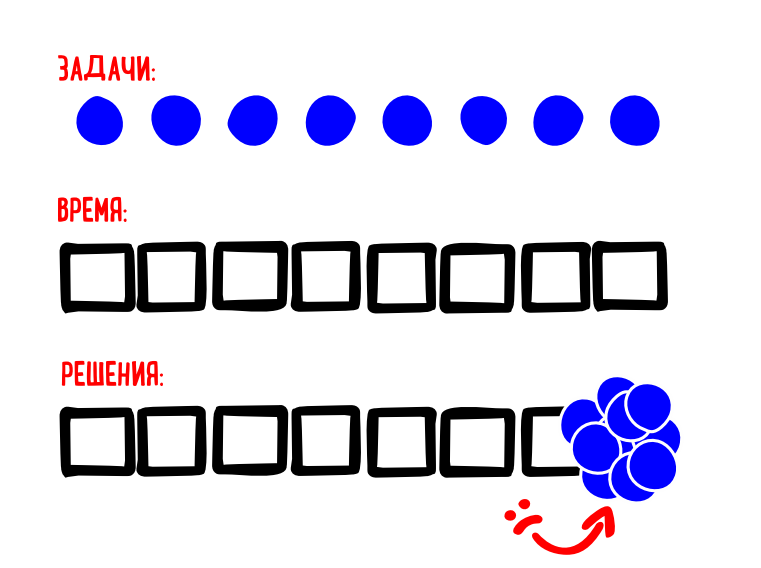
')
There is even a study that proves that the life of a procrastinator is shorter than the life of a person who does everything on time, because he prokrastirut even visits to doctors.
There is no doubt that procrastination, and especially the fight against it, is a very hot topic for all of us. The world in which we live is very complex and is developing very quickly, there is the Internet, social networks, letters, chat rooms and a huge number of various other distractions. Therefore, the level of procrastination is greatly increased, and the skill of controlling it is most important in order to achieve success in your personal life.
Under the cut, the story of Peter Ludwig at the Aletheia Business 2017 conference on how to put an end to procrastination using three simple tools. As soon as you embed them in your life, you will immediately notice the difference. You will be more productive, you will feel happier and you will have more energy .
About the speaker: Peter Ludwig has been working on the study of procrastination all his life, and for the last 10 years he has been actively seeking methods to combat it. He wrote a book about it, which became a bestseller in 4 countries, translated into 7 languages and is in great demand. Which once again confirms how often people experience procrastination.

Let's look at another example of procrastination. Suppose you have a task that you need to perform, there are classes that you like and that you want to do, and what you actually do.
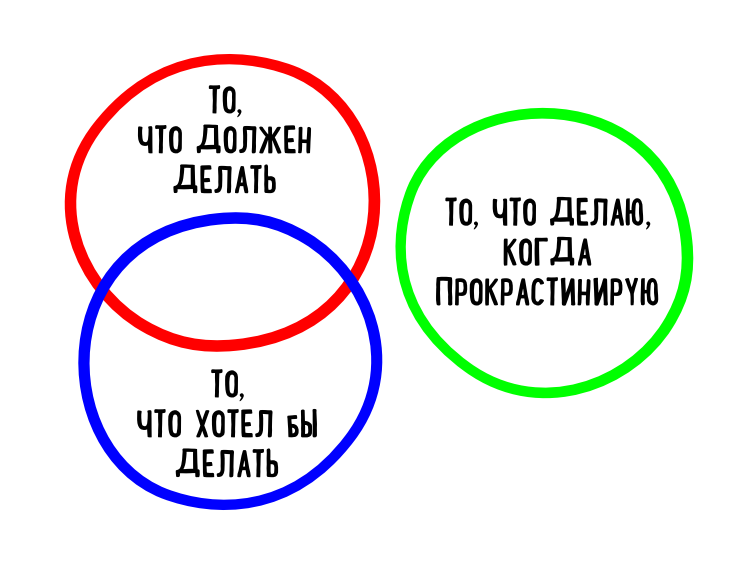
You know that there are certain tasks that will change the world for the better, help you to become better yourself as individuals, but ... You are watching the next episode of “Game of Thrones”, watering the plants in the office or, for example, set off the alarm clock.
If you do not wake up from the first alarm bell, this is also one of the procrastination formats.
Let's start by not postponing the fight against procrastination!
Albert Einstein once said:
What do you think when procrastination started in the history of mankind? It happened much earlier than a few thousand years ago. The philosopher Seneca once said:
As I said, we live in a unique time. I have a few graphs that I would like to show you.
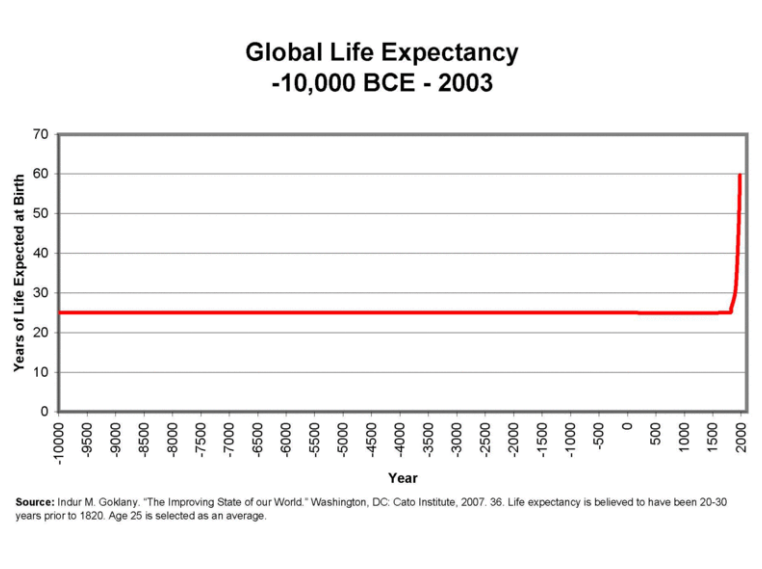
The graph above shows the average life expectancy for the last 10,000 years. Almost all this time, the average life expectancy was 25 years, but over the last hundred years it has increased by 2 times. The reason for this growth lies mainly in the fact that the death rate among children has decreased, and vaccines have been found against the most dangerous and powerful viruses.
Below is another interesting graph that shows the chances that you will be killed.
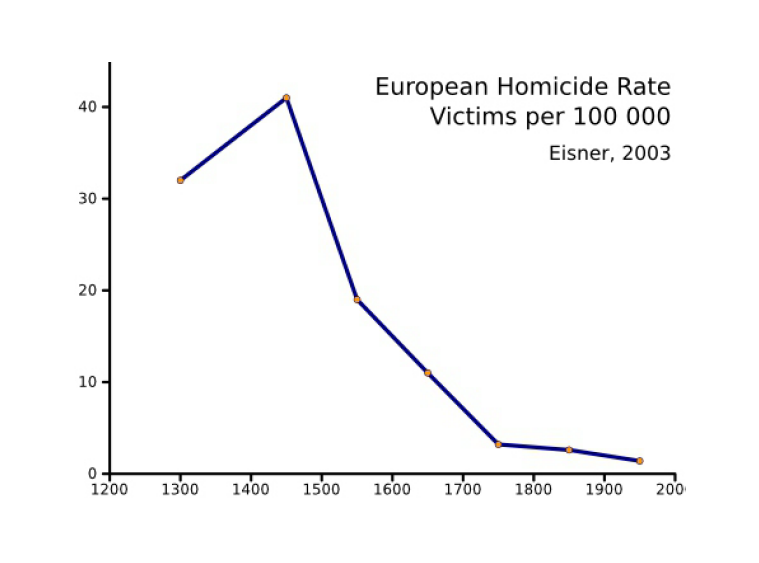
It shows that we live in the most peaceful time in history . There are fewer wars on Earth than ever before, and the chance of being killed is minimal. If you lived 100, 200, 300 or even 400 years ago, it would be 10 times higher.
The growth of the development of science and technology in our time is taking place exponentially. This is very noticeable on mobile phones, which are now more powerful than the coolest computer 20 years ago.
Let's take a look at how technology has changed over the past 100 years.
In 1903, we made our first flight.
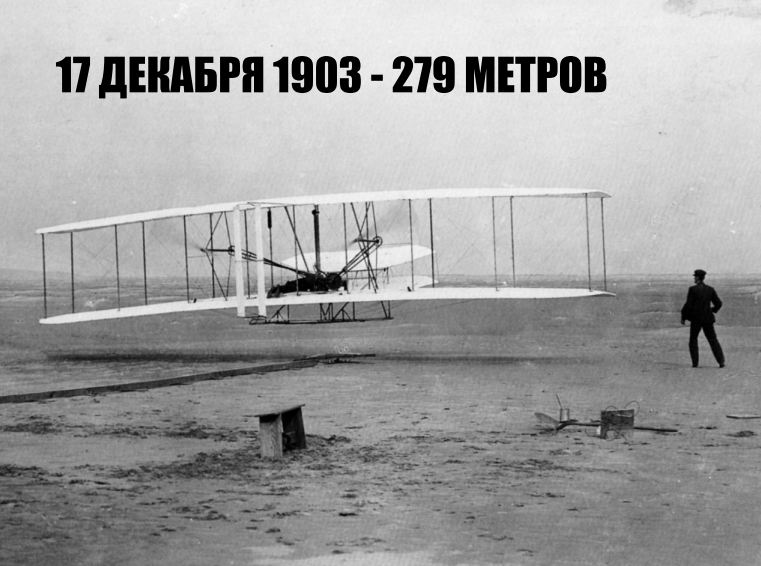
Only 60 years later we landed on the moon.
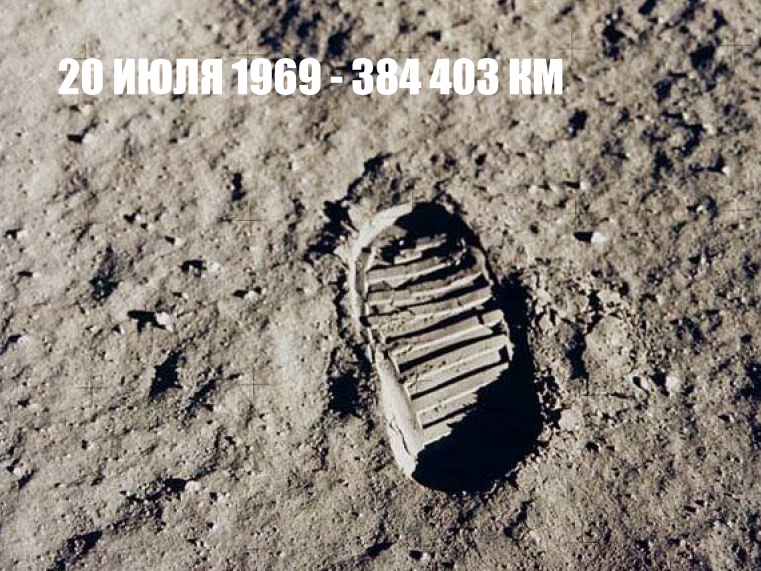
A few years ago we sent our first rover to Mars.

And, as you know, Ilon Mask says that in 5-10 years he wants to send there living people.
Studies show that over the past 100 years, the level of success in the development of technology exceeds all that we have achieved in its entire history. We are very lucky!
But do you think people have become happier in our time than 100 years ago?
Research shows that people are actually less and less happy . There are reasons for this. One of them is the complexity of our world.
As I said, complexity is one of the most important friends of procrastination .

This is the most terrible illustration of procrastination called “ Paralysis of choice ” - the more choice, the harder it is to choose. We are experiencing this kind of paralysis in our everyday life: how to start a letter, what work to go to, which girl to meet, etc.
Therefore, if you find a solution to this problem, you can get rid of procrastination. What is the key to combating procrastination?
I found one phrase that describes the key to victory over procrastination:
There are people who want to start everything: a new life, running in the mornings, their own business, but they do not start. There are people who do a lot, but do not see the point. I do psychology, and in one of our studies, we realized that the cause of depression in people is the lack of meaning . We call it corporate depression.
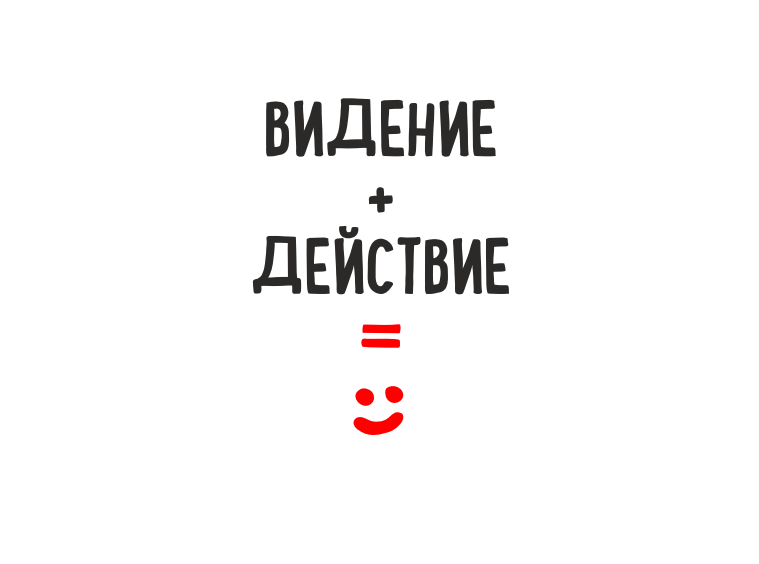
This is the formula of happiness. It only requires two main ingredients:
Now there is a lot of good research about happiness. Most of them show that the key to happiness is not in the realm of material things . It is to live “to the fullest”: to fill every day with meaning and move on the path to your vision.
Next, we delve into the study of both ingredients - vision and action.
If you decide to formulate your own vision, first you need to understand the value of your time. We all have one thing in common: we were born at one moment and we all die. The gap between these points is our time, which we are free to dispose of.

One of the most important questions of our life is how to manage this time in your personal life or in your own business. If you can formulate your personal vision, then you will be more motivated, you will have a more adequate relationship, you will be more healthy and the duration of your life will increase by 5-10 years.
Sometimes we change our view of the world and the value of our own lives if we get very sick or we have many other problems. I had this situation. 12 years ago I had severe health problems, I thought I was going to die.
I played basketball and during the match my right hand began to shake. After a few hours, the right side of my body was completely paralyzed. None of the doctors could diagnose. According to statistics in similar situations, some people die, but the other survives. I was very lucky - I survived, and without any consequences. But I experienced terrible moments of being dying.
This has greatly changed my life, including my view of values, and helped me make important decisions. I opened my own business and changed my field of activity (I finished the magistracy in IT). Later, I wrote a book about how to start to value your time and how to spend less time on meaningless things, because procrastination is the complete opposite of full life .
Therefore, the most important thing that I want to say, never forget about the value of time !
The second is to find the motivation.
There are hundreds of studies studying procrastination and motivation. Most of them show that the carrot and stick method, that is, external motivation, does not work.
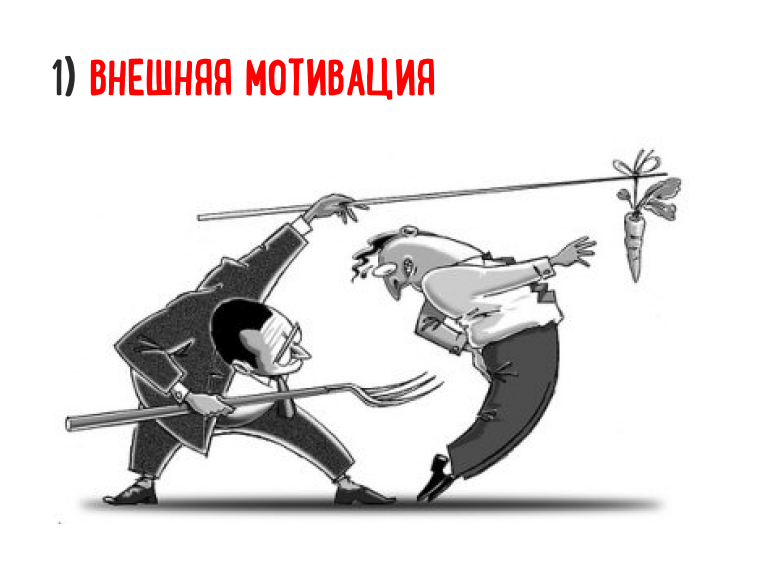
Why does not it work? Because it gives a very short-term effect and people feel unhappy from the whip. If you need to do something, but you do not want to do it, you will not be happy.
The level of dopamine (the hormone of happiness in the head) falls. Which, in turn, affects not only the level of happiness, but also creativity, productivity, and interpersonal skills — in general, brain productivity drops.
External motivation worked in its time, for example, when slavery existed. It works when physical labor predominates. But I believe that most of us need our intelligence in order to complete tasks. Therefore, we need to find a mechanism to turn external motivation into internal.

I used to believe that in life there are two key points:
Most of us do not reach the second stage. Therefore, the meaning of our life is to find, formulate a personal vision and move towards it, because we will be happy on the way to personal vision.
In psychology, there is a term for this - a state of flow , that is, when we are so focused on a business, that we don’t think about any external elements. Time stops for us, we are in the flow, we are concentrated, we enjoy the action.
The state of flow is the complete opposite of procrastination, because in it we are the most productive , effective, use our creativity - we are happy!
There is one study that studies the best people in their field - the best athletes, the best doctors, the best businessmen, writers and artists. They all have one thing in common - a state of flow.
How to find and improve the personal state of the stream? How to find happiness in every moment of life?
You need to change the perception of one model in your head. Usually people think that the results lead us to satisfaction. But research shows that everything is quite the opposite: if we are happy with what we are doing, then only then do we achieve results .
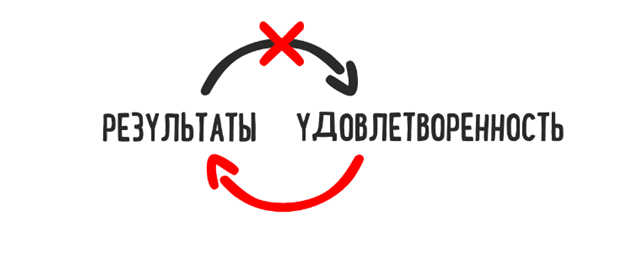
The words of Albert Schweizer describe the results of these studies:
I want to highlight all these 3 ingredients.
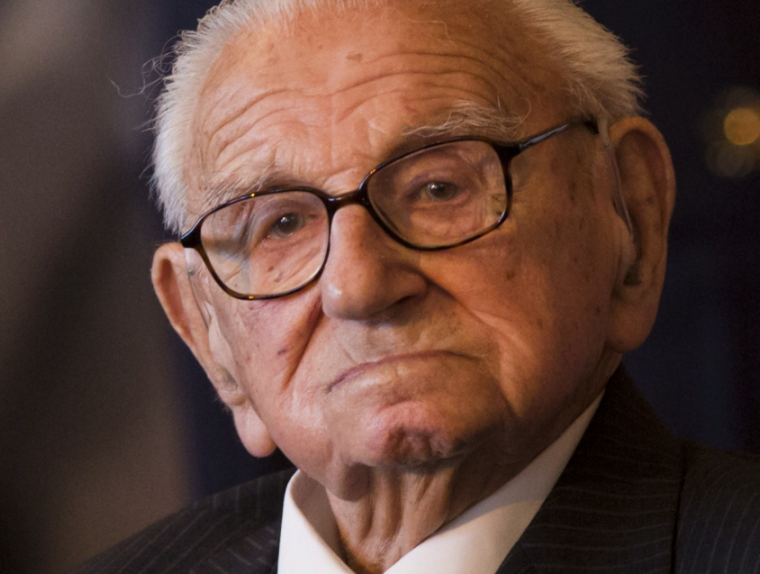
This is Sir Nicholas Winton, who during the Second World War saved 640 Jewish children from the Nazis. He organized the trains, which sent these children to safe England. Sir Nicholas Winton died at the age of 106 years. It symbolizes what we call Ego 2.0 .
What is Ego 1.0 and Ego 2.0?
Ego 1.0 is all we do for ourselves when we concentrate on ourselves. But we are not always selfish. Sometimes we do things for others, like Sir Winton. We call it Ego 2.0 in the style of Mother Teresa.
One very good study shows that one part of the brain physically works and grows when we perform actions related to Ego 2.0.

Exclusively selfish people live a worse life, their average life expectancy is shortened and problems arise in their personal lives. On the contrary, people who live in the concept of Ego 2.0 and give into this world live longer, happier and their lives are more successful, they have the strongest motivation for action.
There is one Japanese word about which I would like to tell you - ikigai .
In Japan, there are several regions in which the average life expectancy is 100 years. This is 20-50 years longer than we live. The secret of their longevity is what is called ikigai.
Ikigai consists of 4 elements:
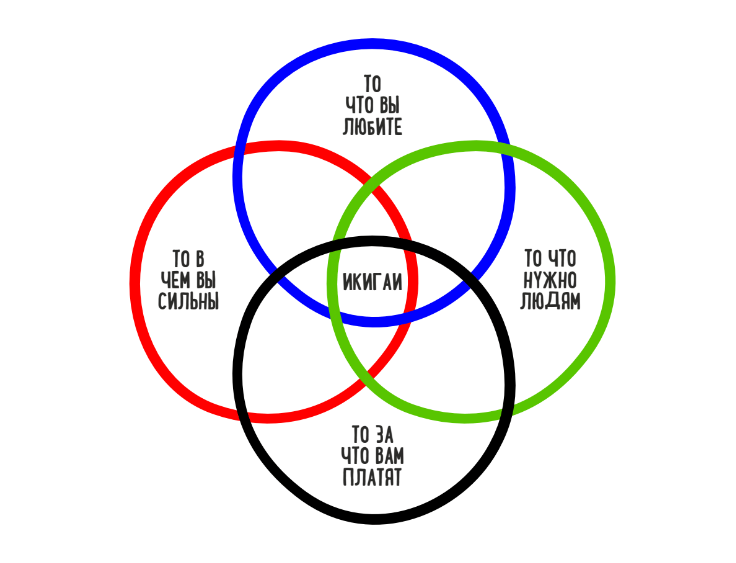
All this together forms ikigai, if you find it in your life, you will live 20 or even 50 years longer , you will be happy and you will be able to find inner motivation.
The first tool I wanted to talk about was to write and formulate a personal vision. For example, in the coming Sunday, take a pen and a piece of paper and try to formulate your personal vision:
If you write all this and then regularly re-read it, you will be able to find motivation in yourself, because you will see the meaning of your actions.
In the book, I have several tools that will allow you to most easily formulate your personal vision. But a very important point - no need to procrastinate in writing a personal vision!
In this part we will talk about how:
All this fits into one word - self-regulation - the skill of giving yourself tasks and the skill of obeying. We humans are doing very badly with this. Every day we order ourselves to do something, but we never obey ourselves.

Sometimes you want to start running, and you charge yourself: “That's it, I'll run now!” But you just sit still. Or we try to keep a diet, but at the same time we eat cupcakes. We have been holding back all day, but after 18:00 we open the refrigerator.
Why is it so difficult for us to maintain self-regulation? The answer lies in understanding the structure of our brain.

The human brain is divided into 3 main parts:
In the traditional system, it is believed that man is rational. But this is not true.
Studies show that the number of connection channels between the rational and emotional brain is 10 times less than the number of reverse channels - between the emotional and rational brain.
In reality, our emotions dictate our actions , but using the rational brain, we can deceive ourselves and pass off such ideas as rational. We are not rational. In 2002, Daniel Kahneman received the Nobel Prize for this research.
There are only a few people who do not procrastinate. Who do you think it is? Psychopaths! Because the psychopath has a disturbed emotional part of the brain. But these people make up only 1% of the population. The rest have an emotional brain, and we just need to find the answer to the question of how to connect the work of the emotional and rational brain.
I have one very simple explanation. This is the metaphor of the elephant and the rider. Imagine that there is a wild elephant and a rider who wants to ride it somewhere. The elephant symbolizes our emotions: it is older, more, but lives only here and now. Therefore, this particular elephant wants to order another beer or watch the next season of the Game of Thrones.
The rider symbolizes our rational thinking. He is weak but smart: he thinks about the future, makes plans, builds strategies. He wants to be healthy, wants to play sports and other useful things.
The rider needs to understand how to work with his elephant to get to the desired point.
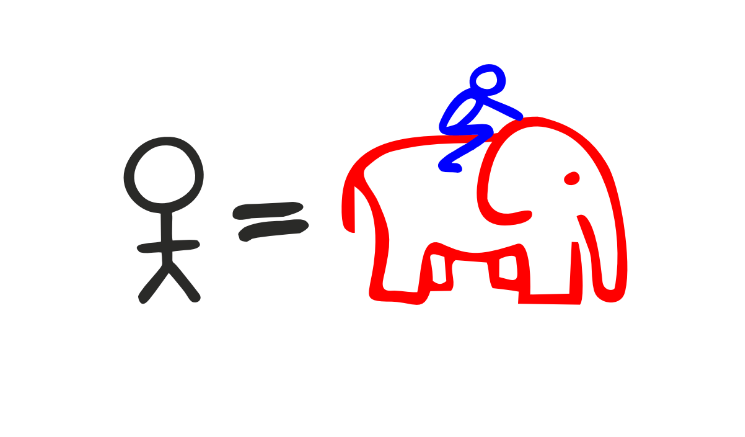
Self-regulation is the skill of managing a personal elephant.
The largest study of procrastination suggests that its cause is the lack of self-regulation. The main point is to understand that an elephant lives in each of us and learn how to control it.
The skill of controlling an elephant lies in our strength of will . For clarity, imagine that your willpower is placed in a glass. If you want to do something useful for yourself, the level of your willpower in the vessel decreases. When we are tired, our strength is exhausted, the level of our willpower is zero, our elephant begins to jerk off.
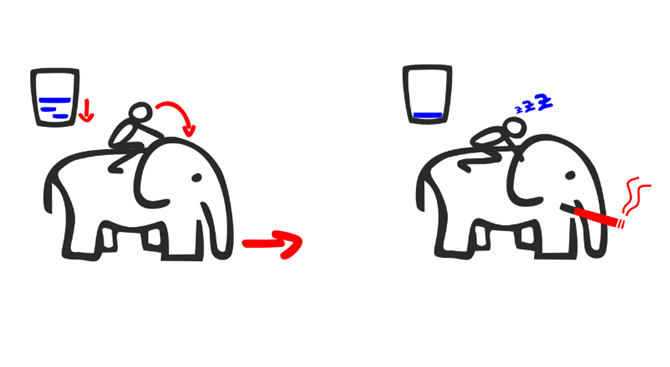
Our bad habits rise out, because we do not have the strength to give up the next cupcake, a glass of beer, etc. The procrastination works to its fullest when we are tired and we have no willpower.
In this regard, I have two good news.
1. Studies show that it is possible to restore the stock of will power during the day.
You can combine: work an hour, go for a walk, work another hour, eat some fruit. As your willpower grows, you will be more productive and able to perform more tasks.
I have one story to illustrate. The forester walked through the forest and saw a woodcutter who was chopping wood with a blunt ax. He approached and asked:
Therefore, the key to the result of productivity is rest during the day. Do not regret that you rest.
2. The second good news - the power of will can be pumped.
Many studies have shown that willpower can be pumped up like a muscle . If you, for example, do push-ups 20 times a day, your muscles will grow. If you do an MRI in this case, you will see that not only your muscles grow, but also the physical frontal part of your brain, which is responsible for willpower.
Even if you are a very cool procrastinator, then by working on yourself you can increase your willpower. Procrastination is not embedded in our genes , and willpower too.
There is one study that has studied identical twins in two different families. One grew very happy and strong, with powerful willpower. The other was much worse.
Only 15-20% of our abilities are in the genes, the rest depends on us.
If you can formulate your personal vision, it is very important that both the elephant and the rider move towards it.
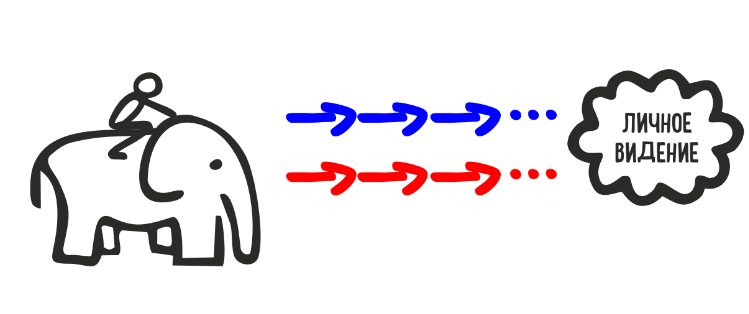
If you are able to flow, your elephant and rider both enjoy the path to personal vision at the same time. The main point is to be able to flow 80% of your time .
But there are barriers to the ideal life. There are things we want to do, but our elephant doesn’t like them. For example, one of our personal visions is a healthy lifestyle. But for this you need to leave the house and run. The elephant does not like to run! Or, for example, one of our personal visions is the creation of a strong family. This means that you need to approach the representative of the opposite sex. But the elephant does not like the opposite sex.
The problem is that our rider - the rational brain - understands what he wants and knows about how to achieve this, but our elephant - the emotional part - most often does not want it.
How to deal with it? How to solve this problem? A million question!
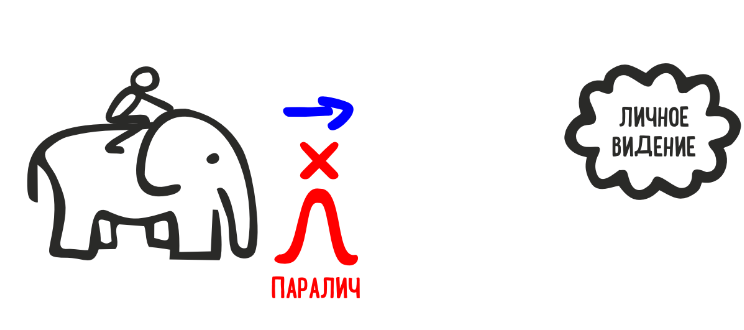
Do not scare the elephant!
There is always a small action that the elephant will not be afraid of. The key to success - start small .
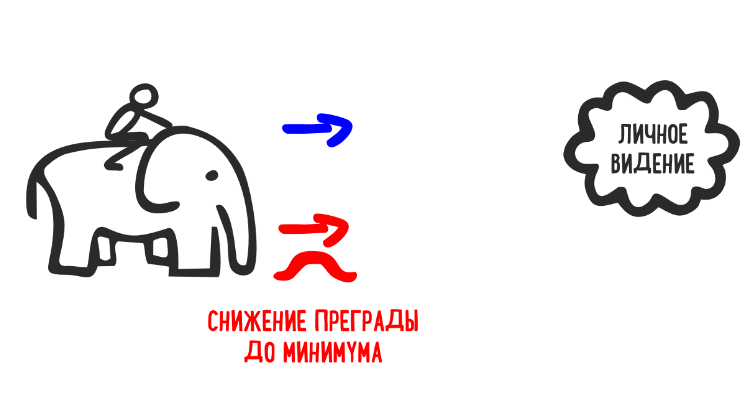
I mean this. For example, you want to start running right tomorrow. If you wind yourself up and think: “Tomorrow I will have to run 5-10 km”, most likely you will scare away the elephant. You just do not run, you pro-prostratem.
But imagine that tomorrow you need to run at least until the next entrance, or just go out in sports uniform - this is the minimum barrier to entry. Always start with the smallest, and then repeat it regularly.
If you repeat the minimum step 20-30 times, sometimes 10 is enough, you will develop a habit. These kinds of habits will help you strengthen your will power. After that, you can raise your minimum and gradually raise it further.
This is represented on the chart.

Always start small and do not frighten your elephant at the beginning. After you manage to form a habit, increase the amount. It is pleasant to implement this kind of practice, because we don’t need to scare our elephant with ideas about something unreal, about large-scale changes right tomorrow. We just need to step by step, gradually move and increase the minimum amount of changes.
In English there is a term Micro habits (mini habits). Remember that there is little much.
Another Japanese word I really like is kaizen . Perhaps it is familiar to you. Japanese samurai always practiced the action in small stages . Even if you want to get to the very peak of the mountain, you should always start with separate steps on the steps up.
You need to understand only 2 simple Japanese words - ikigai and kaizen. I have a practical tool for this.
In English, this tool is called a list of habits (or samoizdevok). In Russian, the “list-mushr” is more appropriate.It looks very simple - a table for 1 month in which you write down skills that you would like to receive, and a minimum that will not frighten your emotional part. Every day, you have to mark what was successful and what was not.
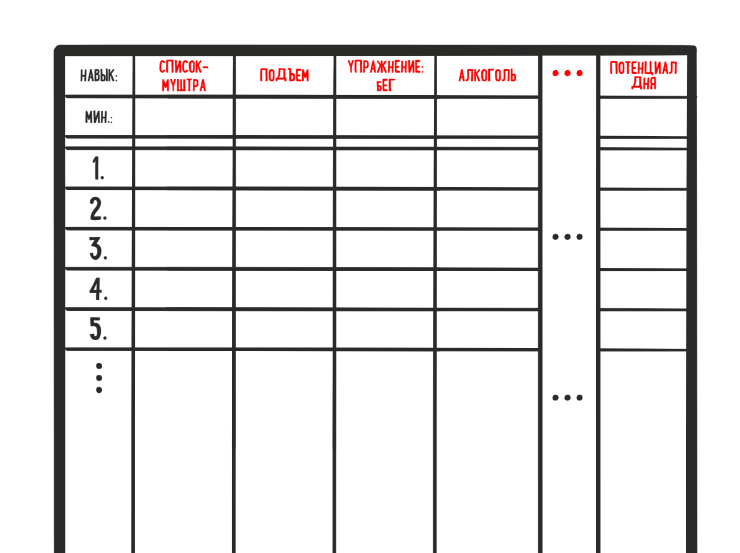
This method is very simple. If you encounter any difficulties in it, you can immediately see whether you are coloring or not, because you will simply have an empty list.
Da Vinci once said:
I will cite another study in which several sellers were taken and forced to run (voluntarily). The results showed that their sales began to grow. This proves that we have one willpower, and we can spend it on everything .
Below is an example table of one of my clients.
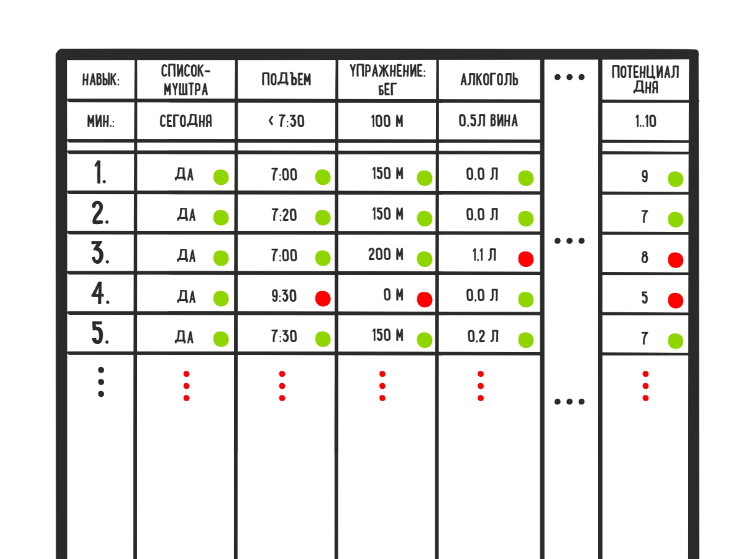
Every day we specify the minimum steps to action. It takes only 2-3 minutes a day. For example, get up to half past seven, run at least 100 m, hold back and do not drink wine.
In this example, on the first day of the month, the person who filled the table woke up at 7 am, ran as much as 150 meters and did not drink a drop of alcohol. But, apparently, on the third day, he gave up a little and drank. The next day, his personal condition deteriorated - he did not fulfill the framework that he had set himself: he woke up at almost 10 o'clock, nor ran a single meter. But he was able to recover - he woke up in time the next day, resumed his run, drank quite a bit.
I think it is now clear how this table works.
It is very simple, but it greatly increases our chances of introducing new, useful habits into life. It is important that the habits you write to the table are related to your personal vision.
For example, if I want to learn how to play the piano and use this table to increase my results, but the piano has nothing to do with my personal vision, the whole table will be red.
But if you fill this table with the skills and habits that will help you to achieve your personal vision , then you will enjoy the implementation, progress , and even the process of filling the table itself. You just feel much more energetic and happier.
Last practical tool. I remind you:
You can start doing it right now!
Why heroism? Usually, hearing this word, we present something unreal: such a powerful and disinterested act that does not fit in our mind - for example, someone prevented a terrorist attack.
At the same time, small actions, for the commission of which we need to overcome something a little, can also be called heroism, just small. Waking up from the first alarm clock is "a little act of heroism ."
I learned this method from the person in the photo below. This is Professor Philip Zimbardo of Stanford University - the most famous psychologist who ever lived. He conducted the most interesting socio-psychological experiment called the Stanford Prison Experiment.

Zimbardo tested a group of volunteers - ordinary people, and chose the most "ordinary" volunteers. Then he divided them into two groups, one called “Prisoners”, and the second - “Guard”. The “Police” arrived, arrested the “Prisoners” and put them in a “prison”, where the “Guards” were already waiting for them.
What do you think happened?
Terrible things - people who played the role of guards, began to invent such harsh punishments that in a few days the research had to be stopped. After that, the psychologist spent 40 years to answer and understand where such aggression comes from.
Few know that Zimbardo also studied the issue of heroism. The answer to the question of why
some people stop in an emergency and try to do something is very interesting, because the causes of aggression and the causes of heroism are very similar.
Now I will explain why this is so. I met Zimbardo three times in my life. The first time was 5 years ago, before I wrote my book. I was interested in what his secret was, how he struggled with procrastination. In one of his books Zimbardo wrote the following phrase:

I think this is very important and I asked him if he knew how to force himself to do something. Instead of answering me with words, Zimbardo did something unusual - he took a black marker and drew a large bullet point on his forehead. I thought that maybe he was already beginning to be senile.

Then he explained what is the meaning of his action. For me, this is one of the wisest thoughts that I would like to share with you.
Zimbardo said that if you go out in public with such a fat point on your forehead, for example, in a shopping center or in public transport, you will get used to the fact that people look at you differently. You start to get the hang of overcoming social comfort .
We, people, have 2 comfort zones:

But outside the comfort zone there is a zone of discomfort when, for example, we wake up, get out of bed and start doing something, or when we stop next to an accident, or when we shout out to the crowd when everyone is silent.
The most important thought about heroism: the skill of overcoming a comfort zone is heroism.
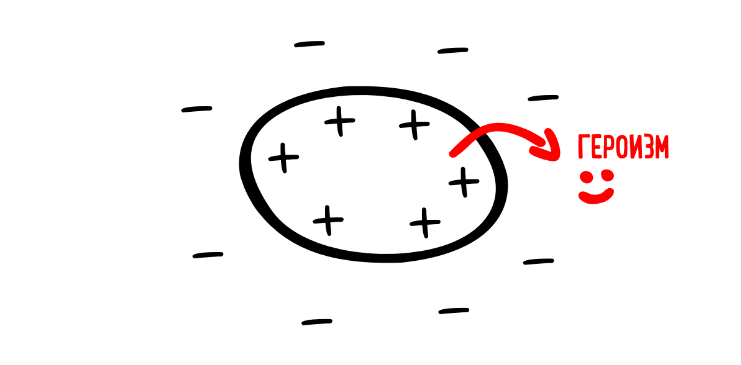
Nobody is born a hero. We become heroes, overcoming ourselves . Every time you overcome some personal difficulty, the chances that we will be able to overcome the same kind of difficulty in the future also increase.
A similar study was conducted with children, they also drew a point on the forehead. A woman was put into the room who pretended she was ill. Children with a dot painted on their forehead stopped much more often to help a woman than those whose forehead was not marked with a dot.
Many people incorrectly believe that our happiness lies in our comfort zone, furnished with material values. It is not true.
To be happy, we need to regularly overcome ourselves .
Once Mahatma Gandhi said:
There is another quote from Einstein:
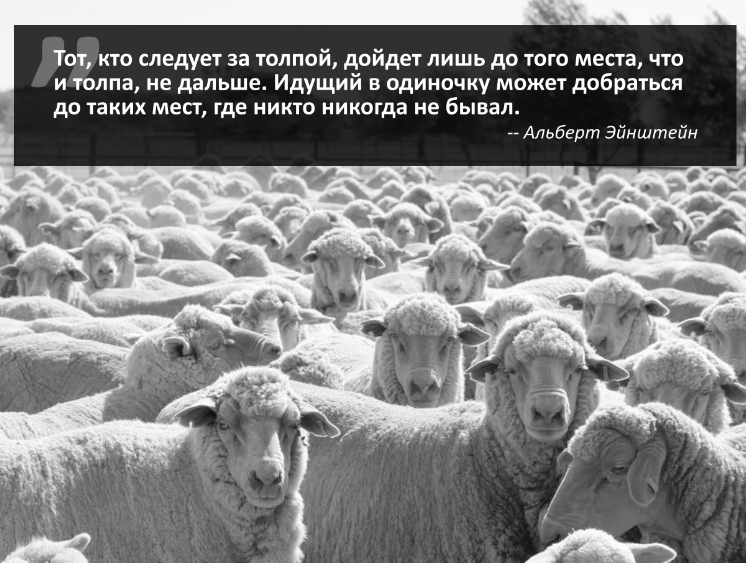
Therefore, if you do not want to be ordinary, do not want your life to be filled with boredom and procrastination, you need to become a hero for yourself. If you act and show heroism, it will be easier for the rest to pull after you , because when the first person stops near a disaster zone, it will be easier for the rest to join him.
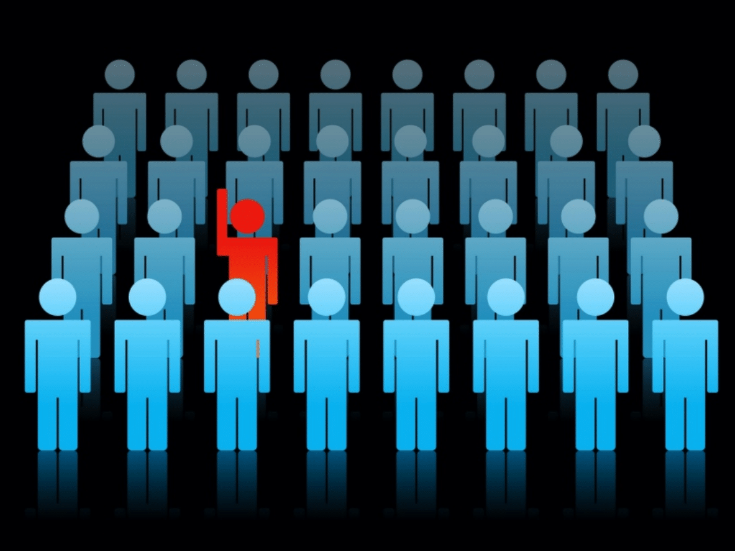
The most important thing is to be the first in this situation, because if the first is not there, then no one will do anything.
There is one story that happened in my hometown near Prague. Once an elderly man was sitting at the main power station, and he choked on food. He died for 10 minutes, and no one helped him. The cameras showed how many people pass by. 2 girls in general just sat side by side and continued chatting. Nobody helped him.
Do you think people are so evil, since they did not help a person? Most likely no.Just their skill of heroism was very poorly developed. They could not take the first step. Most modern research proves that evil is passivity. This is a strong lever of influence on society.
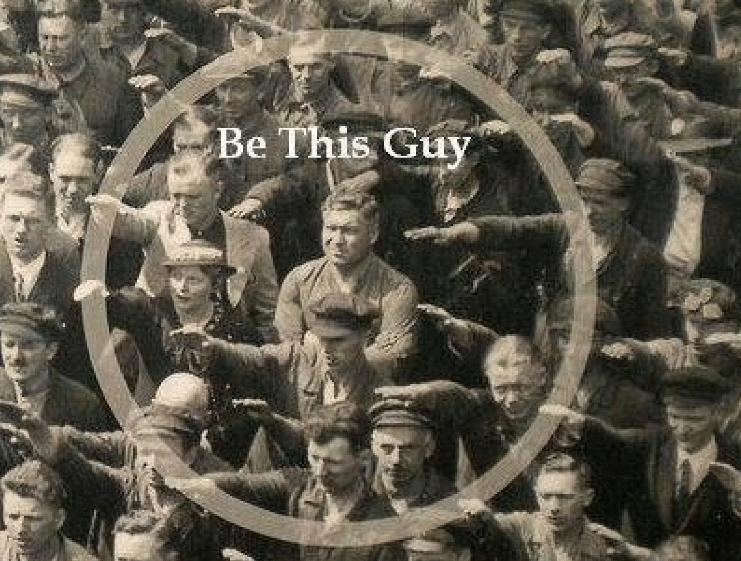
This is Nazi Germany of the 30s. It is evident that all these people idolize Hitler, but one person who opposes this. Be that person!
It is very important to follow your personal values.
The samurai have one tool for making a decision. When a samurai has a desire to be a hero in a certain situation, he applies the rule of 3 heartbeats:
The following quote by Edmund Burke describes this situation well:
For example, recently I passed by a burning urn, found water and extinguished the flame. I spent only 3 minutes on this, but there were a lot of people around who were just passing by, although the fire was quite strong.
Remember, the heroes - 3, 2, 1 - and act!
From my point of view, heroism is the basis of my work.
Now you know that to achieve personal happiness you need to work in two directions:
You also have three tools for working on them:

If you put it all together, you can conquer your procrastination, your life will be filled with happiness, and you will inspire others. I sincerely believe that if we want to change something in society, we must begin with ourselves, because the only way to influence others is to become better ourselves.
I would like to finish with one simple thought:
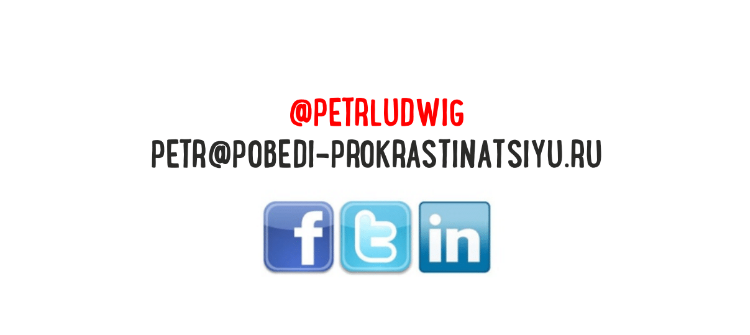
The problem is that procrastination always makes us feel worse , affects our productivity and our level of happiness.

')
There is even a study that proves that the life of a procrastinator is shorter than the life of a person who does everything on time, because he prokrastirut even visits to doctors.
There is no doubt that procrastination, and especially the fight against it, is a very hot topic for all of us. The world in which we live is very complex and is developing very quickly, there is the Internet, social networks, letters, chat rooms and a huge number of various other distractions. Therefore, the level of procrastination is greatly increased, and the skill of controlling it is most important in order to achieve success in your personal life.
Under the cut, the story of Peter Ludwig at the Aletheia Business 2017 conference on how to put an end to procrastination using three simple tools. As soon as you embed them in your life, you will immediately notice the difference. You will be more productive, you will feel happier and you will have more energy .
About the speaker: Peter Ludwig has been working on the study of procrastination all his life, and for the last 10 years he has been actively seeking methods to combat it. He wrote a book about it, which became a bestseller in 4 countries, translated into 7 languages and is in great demand. Which once again confirms how often people experience procrastination.

Let's look at another example of procrastination. Suppose you have a task that you need to perform, there are classes that you like and that you want to do, and what you actually do.

You know that there are certain tasks that will change the world for the better, help you to become better yourself as individuals, but ... You are watching the next episode of “Game of Thrones”, watering the plants in the office or, for example, set off the alarm clock.
If you do not wake up from the first alarm bell, this is also one of the procrastination formats.
Let's start by not postponing the fight against procrastination!
Albert Einstein once said:
“If you cannot explain it simply, then you yourself do not understand it to the end.”I really like this quote because if you really want to understand something, you need to look for the most simple answer. That is why I use the images here and in my book.
What do you think when procrastination started in the history of mankind? It happened much earlier than a few thousand years ago. The philosopher Seneca once said:
This simple sentence explains why procrastination is not good: when we procrastinate, we spend our time. From my point of view, time is the most valuable resource in our life. It is impossible to occupy, save or increase. Every minute spent on procrastination is spent forever.
"As long as we put off life, it passes."
Nowadays
As I said, we live in a unique time. I have a few graphs that I would like to show you.

The graph above shows the average life expectancy for the last 10,000 years. Almost all this time, the average life expectancy was 25 years, but over the last hundred years it has increased by 2 times. The reason for this growth lies mainly in the fact that the death rate among children has decreased, and vaccines have been found against the most dangerous and powerful viruses.
Below is another interesting graph that shows the chances that you will be killed.

It shows that we live in the most peaceful time in history . There are fewer wars on Earth than ever before, and the chance of being killed is minimal. If you lived 100, 200, 300 or even 400 years ago, it would be 10 times higher.
The growth of the development of science and technology in our time is taking place exponentially. This is very noticeable on mobile phones, which are now more powerful than the coolest computer 20 years ago.
Let's take a look at how technology has changed over the past 100 years.
In 1903, we made our first flight.

Only 60 years later we landed on the moon.

A few years ago we sent our first rover to Mars.

And, as you know, Ilon Mask says that in 5-10 years he wants to send there living people.
Studies show that over the past 100 years, the level of success in the development of technology exceeds all that we have achieved in its entire history. We are very lucky!
But do you think people have become happier in our time than 100 years ago?
Research shows that people are actually less and less happy . There are reasons for this. One of them is the complexity of our world.
As I said, complexity is one of the most important friends of procrastination .

This is the most terrible illustration of procrastination called “ Paralysis of choice ” - the more choice, the harder it is to choose. We are experiencing this kind of paralysis in our everyday life: how to start a letter, what work to go to, which girl to meet, etc.
Therefore, if you find a solution to this problem, you can get rid of procrastination. What is the key to combating procrastination?
I found one phrase that describes the key to victory over procrastination:
A plan without action is a dream.These two simple lines describe the most important problems that we face in the modern world.
Action without intention is a nightmare
Japanese proverb
There are people who want to start everything: a new life, running in the mornings, their own business, but they do not start. There are people who do a lot, but do not see the point. I do psychology, and in one of our studies, we realized that the cause of depression in people is the lack of meaning . We call it corporate depression.

This is the formula of happiness. It only requires two main ingredients:
- Your own vision.
- Enough power to take action on the path to your vision.
Now there is a lot of good research about happiness. Most of them show that the key to happiness is not in the realm of material things . It is to live “to the fullest”: to fill every day with meaning and move on the path to your vision.
Next, we delve into the study of both ingredients - vision and action.
Vision
If you decide to formulate your own vision, first you need to understand the value of your time. We all have one thing in common: we were born at one moment and we all die. The gap between these points is our time, which we are free to dispose of.

One of the most important questions of our life is how to manage this time in your personal life or in your own business. If you can formulate your personal vision, then you will be more motivated, you will have a more adequate relationship, you will be more healthy and the duration of your life will increase by 5-10 years.
Finding the meaning of your own life is the most powerful motivator.There is one study in which older people asked what they regret and what lessons they learned from their lives. They all had one thing in common.
"People in their lives do not regret what they did, but regret what they did not do."Therefore, it is very important to find your own meaning of life and move towards it. Even if there are failures and setbacks on the path to personal vision, you will still feel better. Sometimes in life you have to go through very difficult moments that radically change our outlook on life. For example, if you limit access to drinking water for at least a week, in a week you will be quite different in assessing its availability.
Philip Zimbardo
Sometimes we change our view of the world and the value of our own lives if we get very sick or we have many other problems. I had this situation. 12 years ago I had severe health problems, I thought I was going to die.
I played basketball and during the match my right hand began to shake. After a few hours, the right side of my body was completely paralyzed. None of the doctors could diagnose. According to statistics in similar situations, some people die, but the other survives. I was very lucky - I survived, and without any consequences. But I experienced terrible moments of being dying.
This has greatly changed my life, including my view of values, and helped me make important decisions. I opened my own business and changed my field of activity (I finished the magistracy in IT). Later, I wrote a book about how to start to value your time and how to spend less time on meaningless things, because procrastination is the complete opposite of full life .
Therefore, the most important thing that I want to say, never forget about the value of time !
The second is to find the motivation.
Motivation
There are hundreds of studies studying procrastination and motivation. Most of them show that the carrot and stick method, that is, external motivation, does not work.

Why does not it work? Because it gives a very short-term effect and people feel unhappy from the whip. If you need to do something, but you do not want to do it, you will not be happy.
The level of dopamine (the hormone of happiness in the head) falls. Which, in turn, affects not only the level of happiness, but also creativity, productivity, and interpersonal skills — in general, brain productivity drops.
External motivation worked in its time, for example, when slavery existed. It works when physical labor predominates. But I believe that most of us need our intelligence in order to complete tasks. Therefore, we need to find a mechanism to turn external motivation into internal.

I used to believe that in life there are two key points:
- Birth
- When we are aware of the full responsibility for privacy.
Most of us do not reach the second stage. Therefore, the meaning of our life is to find, formulate a personal vision and move towards it, because we will be happy on the way to personal vision.
In psychology, there is a term for this - a state of flow , that is, when we are so focused on a business, that we don’t think about any external elements. Time stops for us, we are in the flow, we are concentrated, we enjoy the action.
The state of flow is the complete opposite of procrastination, because in it we are the most productive , effective, use our creativity - we are happy!
There is one study that studies the best people in their field - the best athletes, the best doctors, the best businessmen, writers and artists. They all have one thing in common - a state of flow.
How to find and improve the personal state of the stream? How to find happiness in every moment of life?
You need to change the perception of one model in your head. Usually people think that the results lead us to satisfaction. But research shows that everything is quite the opposite: if we are happy with what we are doing, then only then do we achieve results .

The words of Albert Schweizer describe the results of these studies:
Success is not the key to satisfaction. Satisfaction is the key to success. If you love what you do, then you will be successful.There are three main components in order to achieve the flow state:
- Meaning.
- Professionalism.
- Intrinsic motivation.
I want to highlight all these 3 ingredients.
Meaning

This is Sir Nicholas Winton, who during the Second World War saved 640 Jewish children from the Nazis. He organized the trains, which sent these children to safe England. Sir Nicholas Winton died at the age of 106 years. It symbolizes what we call Ego 2.0 .
What is Ego 1.0 and Ego 2.0?
Ego 1.0 is all we do for ourselves when we concentrate on ourselves. But we are not always selfish. Sometimes we do things for others, like Sir Winton. We call it Ego 2.0 in the style of Mother Teresa.
One very good study shows that one part of the brain physically works and grows when we perform actions related to Ego 2.0.

Exclusively selfish people live a worse life, their average life expectancy is shortened and problems arise in their personal lives. On the contrary, people who live in the concept of Ego 2.0 and give into this world live longer, happier and their lives are more successful, they have the strongest motivation for action.
There is one Japanese word about which I would like to tell you - ikigai .
In Japan, there are several regions in which the average life expectancy is 100 years. This is 20-50 years longer than we live. The secret of their longevity is what is called ikigai.
Ikigai consists of 4 elements:
- What you are strong at.
- What you like, what you enjoy.
- The element of Ego 2.0, when you give to the world - do what people need.
- Money, more precisely, that allows you to earn so much that you do not think about it.

All this together forms ikigai, if you find it in your life, you will live 20 or even 50 years longer , you will be happy and you will be able to find inner motivation.
Personal vision
The first tool I wanted to talk about was to write and formulate a personal vision. For example, in the coming Sunday, take a pen and a piece of paper and try to formulate your personal vision:
- Write out your values.
- Try to answer the question of how strong you are.
- Think about how you can be useful to society, how you can give to this world.
If you write all this and then regularly re-read it, you will be able to find motivation in yourself, because you will see the meaning of your actions.
In the book, I have several tools that will allow you to most easily formulate your personal vision. But a very important point - no need to procrastinate in writing a personal vision!
Once a client came to me and said:Set aside some time on one of the days off. Do not worry - this document should not look perfect. You can start with the beta version, write a few sentences, but you need to start.
- Take my money and write my personal vision.
- I can not do it. This is the only thing you have to do personally.
Act
In this part we will talk about how:
- be more productive;
- manage personal time;
- prioritize.
All this fits into one word - self-regulation - the skill of giving yourself tasks and the skill of obeying. We humans are doing very badly with this. Every day we order ourselves to do something, but we never obey ourselves.

Sometimes you want to start running, and you charge yourself: “That's it, I'll run now!” But you just sit still. Or we try to keep a diet, but at the same time we eat cupcakes. We have been holding back all day, but after 18:00 we open the refrigerator.
Why is it so difficult for us to maintain self-regulation? The answer lies in understanding the structure of our brain.

The human brain is divided into 3 main parts:
- The oldest part is the reptile brain . This part of the brain can not be controlled by willpower. None of us can commit suicide by holding our breath.
- The next part of the brain is the limbic system , which is responsible for our emotions.
- The last part of the brain - the neocortex - is very young compared to the rest, it is only a few hundred thousand years old. This part of the brain is responsible for our rational actions, for making decisions. It is our main difference from animals.
In the traditional system, it is believed that man is rational. But this is not true.
Studies show that the number of connection channels between the rational and emotional brain is 10 times less than the number of reverse channels - between the emotional and rational brain.
In reality, our emotions dictate our actions , but using the rational brain, we can deceive ourselves and pass off such ideas as rational. We are not rational. In 2002, Daniel Kahneman received the Nobel Prize for this research.
There are only a few people who do not procrastinate. Who do you think it is? Psychopaths! Because the psychopath has a disturbed emotional part of the brain. But these people make up only 1% of the population. The rest have an emotional brain, and we just need to find the answer to the question of how to connect the work of the emotional and rational brain.
I have one very simple explanation. This is the metaphor of the elephant and the rider. Imagine that there is a wild elephant and a rider who wants to ride it somewhere. The elephant symbolizes our emotions: it is older, more, but lives only here and now. Therefore, this particular elephant wants to order another beer or watch the next season of the Game of Thrones.
The rider symbolizes our rational thinking. He is weak but smart: he thinks about the future, makes plans, builds strategies. He wants to be healthy, wants to play sports and other useful things.
The rider needs to understand how to work with his elephant to get to the desired point.

Self-regulation is the skill of managing a personal elephant.
The largest study of procrastination suggests that its cause is the lack of self-regulation. The main point is to understand that an elephant lives in each of us and learn how to control it.
The skill of controlling an elephant lies in our strength of will . For clarity, imagine that your willpower is placed in a glass. If you want to do something useful for yourself, the level of your willpower in the vessel decreases. When we are tired, our strength is exhausted, the level of our willpower is zero, our elephant begins to jerk off.

Our bad habits rise out, because we do not have the strength to give up the next cupcake, a glass of beer, etc. The procrastination works to its fullest when we are tired and we have no willpower.
In this regard, I have two good news.
1. Studies show that it is possible to restore the stock of will power during the day.
- 5-10 minutes walk can increase the level of willpower. For example, work an hour, go for a walk, and work another hour.
- Sugar in fruits and vegetables affects the increase of willpower.
You can combine: work an hour, go for a walk, work another hour, eat some fruit. As your willpower grows, you will be more productive and able to perform more tasks.
I have one story to illustrate. The forester walked through the forest and saw a woodcutter who was chopping wood with a blunt ax. He approached and asked:
“Why do you chop wood with an unfinished ax?”This situation occurs in the lives of many of us. These are workaholic people who work 12 hours a day with a blunt ax. Therefore, remember that if you stop, relax a little , think and sharpen your ax, that is, take a walk or eat a fruit, then our level of productivity will increase . We can cut down a tree much faster.
- Leave me alone! I have no time! I cut wood!
Therefore, the key to the result of productivity is rest during the day. Do not regret that you rest.
2. The second good news - the power of will can be pumped.
Many studies have shown that willpower can be pumped up like a muscle . If you, for example, do push-ups 20 times a day, your muscles will grow. If you do an MRI in this case, you will see that not only your muscles grow, but also the physical frontal part of your brain, which is responsible for willpower.
Even if you are a very cool procrastinator, then by working on yourself you can increase your willpower. Procrastination is not embedded in our genes , and willpower too.
There is one study that has studied identical twins in two different families. One grew very happy and strong, with powerful willpower. The other was much worse.
Only 15-20% of our abilities are in the genes, the rest depends on us.
How to pump willpower?
If you can formulate your personal vision, it is very important that both the elephant and the rider move towards it.

If you are able to flow, your elephant and rider both enjoy the path to personal vision at the same time. The main point is to be able to flow 80% of your time .
But there are barriers to the ideal life. There are things we want to do, but our elephant doesn’t like them. For example, one of our personal visions is a healthy lifestyle. But for this you need to leave the house and run. The elephant does not like to run! Or, for example, one of our personal visions is the creation of a strong family. This means that you need to approach the representative of the opposite sex. But the elephant does not like the opposite sex.
The problem is that our rider - the rational brain - understands what he wants and knows about how to achieve this, but our elephant - the emotional part - most often does not want it.
How to deal with it? How to solve this problem? A million question!

Do not scare the elephant!
There is always a small action that the elephant will not be afraid of. The key to success - start small .

I mean this. For example, you want to start running right tomorrow. If you wind yourself up and think: “Tomorrow I will have to run 5-10 km”, most likely you will scare away the elephant. You just do not run, you pro-prostratem.
But imagine that tomorrow you need to run at least until the next entrance, or just go out in sports uniform - this is the minimum barrier to entry. Always start with the smallest, and then repeat it regularly.
If you repeat the minimum step 20-30 times, sometimes 10 is enough, you will develop a habit. These kinds of habits will help you strengthen your will power. After that, you can raise your minimum and gradually raise it further.
This is represented on the chart.

Always start small and do not frighten your elephant at the beginning. After you manage to form a habit, increase the amount. It is pleasant to implement this kind of practice, because we don’t need to scare our elephant with ideas about something unreal, about large-scale changes right tomorrow. We just need to step by step, gradually move and increase the minimum amount of changes.
In English there is a term Micro habits (mini habits). Remember that there is little much.
Kaizen
Another Japanese word I really like is kaizen . Perhaps it is familiar to you. Japanese samurai always practiced the action in small stages . Even if you want to get to the very peak of the mountain, you should always start with separate steps on the steps up.
You need to understand only 2 simple Japanese words - ikigai and kaizen. I have a practical tool for this.
List Mushtra
In English, this tool is called a list of habits (or samoizdevok). In Russian, the “list-mushr” is more appropriate.It looks very simple - a table for 1 month in which you write down skills that you would like to receive, and a minimum that will not frighten your emotional part. Every day, you have to mark what was successful and what was not.

This method is very simple. If you encounter any difficulties in it, you can immediately see whether you are coloring or not, because you will simply have an empty list.
Da Vinci once said:
“Simplicity is the perfect solution.”This list-mushra allows us to develop certain skills and increase our own willpower. But the fact is that with an increase in willpower within these skills, it will increase no matter what you want to use it.
I will cite another study in which several sellers were taken and forced to run (voluntarily). The results showed that their sales began to grow. This proves that we have one willpower, and we can spend it on everything .
Below is an example table of one of my clients.

- The first skill is the skill of filling the drill table itself. If you pro-grow it, then it obviously will not help you.
- The following habit includes all aspects of sleep: how many hours you sleep, what time you wake up and what time you go to bed.
- : , , .
- , , , .
- , 1 — , , 10 — . — .
Every day we specify the minimum steps to action. It takes only 2-3 minutes a day. For example, get up to half past seven, run at least 100 m, hold back and do not drink wine.
In this example, on the first day of the month, the person who filled the table woke up at 7 am, ran as much as 150 meters and did not drink a drop of alcohol. But, apparently, on the third day, he gave up a little and drank. The next day, his personal condition deteriorated - he did not fulfill the framework that he had set himself: he woke up at almost 10 o'clock, nor ran a single meter. But he was able to recover - he woke up in time the next day, resumed his run, drank quite a bit.
I think it is now clear how this table works.
It is very simple, but it greatly increases our chances of introducing new, useful habits into life. It is important that the habits you write to the table are related to your personal vision.
For example, if I want to learn how to play the piano and use this table to increase my results, but the piano has nothing to do with my personal vision, the whole table will be red.
But if you fill this table with the skills and habits that will help you to achieve your personal vision , then you will enjoy the implementation, progress , and even the process of filling the table itself. You just feel much more energetic and happier.
Heroism
Last practical tool. I remind you:
- The first tool is a leaf with the formulation of a personal vision;
- The second tool is a list of habits (list-mushr)
- The last tool is heroism.
You can start doing it right now!
Why heroism? Usually, hearing this word, we present something unreal: such a powerful and disinterested act that does not fit in our mind - for example, someone prevented a terrorist attack.
At the same time, small actions, for the commission of which we need to overcome something a little, can also be called heroism, just small. Waking up from the first alarm clock is "a little act of heroism ."
How to be a hero every day?
I learned this method from the person in the photo below. This is Professor Philip Zimbardo of Stanford University - the most famous psychologist who ever lived. He conducted the most interesting socio-psychological experiment called the Stanford Prison Experiment.

Zimbardo tested a group of volunteers - ordinary people, and chose the most "ordinary" volunteers. Then he divided them into two groups, one called “Prisoners”, and the second - “Guard”. The “Police” arrived, arrested the “Prisoners” and put them in a “prison”, where the “Guards” were already waiting for them.
What do you think happened?
Terrible things - people who played the role of guards, began to invent such harsh punishments that in a few days the research had to be stopped. After that, the psychologist spent 40 years to answer and understand where such aggression comes from.
Few know that Zimbardo also studied the issue of heroism. The answer to the question of why
some people stop in an emergency and try to do something is very interesting, because the causes of aggression and the causes of heroism are very similar.
Now I will explain why this is so. I met Zimbardo three times in my life. The first time was 5 years ago, before I wrote my book. I was interested in what his secret was, how he struggled with procrastination. In one of his books Zimbardo wrote the following phrase:

I think this is very important and I asked him if he knew how to force himself to do something. Instead of answering me with words, Zimbardo did something unusual - he took a black marker and drew a large bullet point on his forehead. I thought that maybe he was already beginning to be senile.

Then he explained what is the meaning of his action. For me, this is one of the wisest thoughts that I would like to share with you.
Zimbardo said that if you go out in public with such a fat point on your forehead, for example, in a shopping center or in public transport, you will get used to the fact that people look at you differently. You start to get the hang of overcoming social comfort .
We, people, have 2 comfort zones:
- On the physical level. Imagine a warm bath in the morning or when you are alone in yours.
- Social comfort zone. This means that we are a part of society.

But outside the comfort zone there is a zone of discomfort when, for example, we wake up, get out of bed and start doing something, or when we stop next to an accident, or when we shout out to the crowd when everyone is silent.
The most important thought about heroism: the skill of overcoming a comfort zone is heroism.

Nobody is born a hero. We become heroes, overcoming ourselves . Every time you overcome some personal difficulty, the chances that we will be able to overcome the same kind of difficulty in the future also increase.
A similar study was conducted with children, they also drew a point on the forehead. A woman was put into the room who pretended she was ill. Children with a dot painted on their forehead stopped much more often to help a woman than those whose forehead was not marked with a dot.
To be a hero is to act. The hero acts.An interesting note: the path to happiness lies outside our comfort zone.
Many people incorrectly believe that our happiness lies in our comfort zone, furnished with material values. It is not true.
To be happy, we need to regularly overcome ourselves .
Once Mahatma Gandhi said:
Doing what we most fear is the first step to success.Being a hero for yourself means overcoming your own fears, going out of your own comfort zone.
There is another quote from Einstein:

Therefore, if you do not want to be ordinary, do not want your life to be filled with boredom and procrastination, you need to become a hero for yourself. If you act and show heroism, it will be easier for the rest to pull after you , because when the first person stops near a disaster zone, it will be easier for the rest to join him.

The most important thing is to be the first in this situation, because if the first is not there, then no one will do anything.
There is one story that happened in my hometown near Prague. Once an elderly man was sitting at the main power station, and he choked on food. He died for 10 minutes, and no one helped him. The cameras showed how many people pass by. 2 girls in general just sat side by side and continued chatting. Nobody helped him.
Do you think people are so evil, since they did not help a person? Most likely no.Just their skill of heroism was very poorly developed. They could not take the first step. Most modern research proves that evil is passivity. This is a strong lever of influence on society.

This is Nazi Germany of the 30s. It is evident that all these people idolize Hitler, but one person who opposes this. Be that person!
It is very important to follow your personal values.
The samurai have one tool for making a decision. When a samurai has a desire to be a hero in a certain situation, he applies the rule of 3 heartbeats:
Act for 3 seconds.If you drive past the accident, make a decision within the first seconds: 3, 2, 1 - and act immediately. It is very important to act in these 3 seconds, because after your brain begins to invent excuses.
The following quote by Edmund Burke describes this situation well:
For the victory of evil, it is enough that good people do nothing.It seems to me that this quote is fair, because it is important to have personal values, but it is equally important to follow them. Sometimes this is just a small simple step.
For example, recently I passed by a burning urn, found water and extinguished the flame. I spent only 3 minutes on this, but there were a lot of people around who were just passing by, although the fire was quite strong.
Remember, the heroes - 3, 2, 1 - and act!
- You may have a chance to save someone's life.
- Perhaps you can change the society for the better.
- Perhaps you can start your own business that will change the world.
From my point of view, heroism is the basis of my work.
Conclusion
Now you know that to achieve personal happiness you need to work in two directions:
- Vision.
- Act.
You also have three tools for working on them:

If you put it all together, you can conquer your procrastination, your life will be filled with happiness, and you will inspire others. I sincerely believe that if we want to change something in society, we must begin with ourselves, because the only way to influence others is to become better ourselves.
I would like to finish with one simple thought:
Do not prokrastiruyte when it comes to combating procrastination.If it seemed interesting to you, write down 1-2 tasks or habits that you are ready to introduce into your life tomorrow. I wish you to overcome your fears, to formulate your personal vision and every day to be a hero for yourself.

, - , , , , . , -, ++ Highload++. 9 . Highload++ Siberia — 30 .
Source: https://habr.com/ru/post/352072/
All Articles